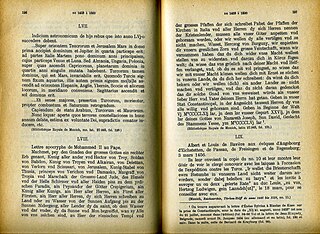
Apocrypha are biblical or related writings not forming part of the accepted canon of Scripture. While some might be of doubtful authorship or authenticity, in Christianity, the word apocryphal (ἀπόκρυφος) was first applied to writings which were to be read privately rather than in the public context of church services. Apocrypha were edifying Christian works that were not considered canonical scripture. It was not until well after the Protestant Reformation that the word apocrypha was used by some ecclesiastics to mean "false," "spurious," "bad," or "heretical."

The Vulgate, sometimes referred to as the Latin Vulgate, is a late-4th-century Latin translation of the Bible.

Enoch is a biblical figure and patriarch prior to Noah's flood, and the son of Jared and father of Methuselah. He was of the Antediluvian period in the Hebrew Bible.

The Book of Jubilees, sometimes called Lesser Genesis or Leptogenesis, is an ancient Jewish apocryphal text of 50 chapters, considered canonical by the Ethiopian Orthodox Tewahedo Church as well as Beta Israel, where it is known as the Book of Division. Jubilees is considered one of the pseudepigrapha by the Eastern Orthodox, Catholic, and Protestant churches. Apart from the Beta Israel community, the book is not considered canonical within any of the denominations of Judaism.
Adam of Saint Victor was a prolific poet and composer of Latin hymns and sequences. He has been called "...the most illustrious exponent of the revival of liturgical poetry which the twelfth century affords."
Partial Bible translations into languages of the English people can be traced back to the late 7th century, including translations into Old and Middle English. More than 100 complete translations into English have been produced. A number of translations have been prepared of parts of the Bible, some deliberately limited to certain books and some projects that have been abandoned before the planned completion.
The Conflict of Adam and Eve with Satan is a 6th-century Christian extracanonical work found in Ge'ez, translated from an Arabic original.
The Life of Adam and Eve, also known in its Greek version as the Apocalypse of Moses, is a Jewish apocryphal group of writings. It recounts the lives of Adam and Eve from after their expulsion from the Garden of Eden to their deaths. It provides more detail about the Fall of Man, including Eve's version of the story. Satan explains that he rebelled when God commanded him to bow down to Adam. After Adam dies, he and all his descendants are promised a resurrection.
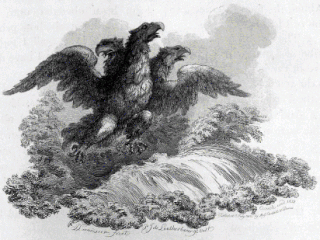
2 Esdras is an apocalyptic book in some English versions of the Bible. Tradition ascribes it to Ezra, a scribe and priest of the fifth century BC, whom the book identifies with the sixth-century figure Shealtiel.
The Book of the Penitence of Adam is a manuscript dealing with Kabbalistic traditions, all of which are embodied in the allegory it contains.
The Letter of Jeremiah, also known as the Epistle of Jeremiah, is a deuterocanonical book of the Old Testament; this letter is attributed to Jeremiah and addressed to the Jews who were about to be carried away as captives to Babylon by Nebuchadnezzar. It is included in Roman Catholic Bibles as the final chapter of the Book of Baruch. It is also included in Orthodox Bibles as a separate book, as well as in the Apocrypha of the Authorized Version.
The Lost Books of the Bible and the Forgotten Books of Eden (1926) is a collection of 17th-century and 18th-century English translations of some Old Testament Pseudepigrapha and New Testament Apocrypha, some of which were assembled in the 1820s, and then republished with the current title in 1926.
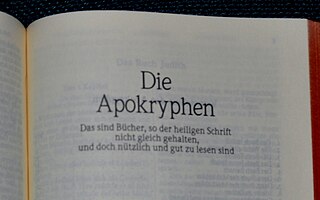
The biblical apocrypha denotes the collection of apocryphal ancient books thought to have been written some time between 200 BCE and 100 CE.
The Legend of the Rood is a complex of medieval tales loosely derived from the Old Testament.
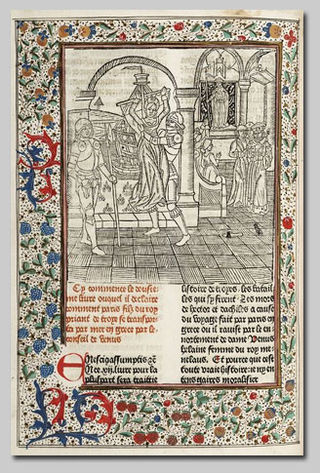
Colard Mansion was a 15th-century Flemish scribe and printer who worked together with William Caxton. He is known as the first printer of a book with copper engravings, and as the printer of the first books in English and French.

The term Catholic Bible can be understood in two ways. More generally, it can refer to a Christian Bible that includes the whole 73-book canon recognized by the Catholic Church, including some of the deuterocanonical books of the Old Testament which are in the Greek Septuagint collection, but which are not present in the Hebrew Masoretic Text collection. More specifically, the term can refer to a version or translation of the Bible which is published with the Catholic Church's approval, in accordance with Catholic canon law.
A biblical canon is a set of texts which a particular Jewish or Christian religious community regards as part of the Bible.
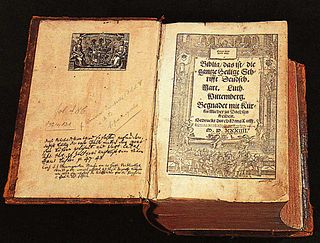
A Protestant Bible is a Christian Bible whose translation or revision was produced by Protestant Christians. Typically translated into a vernacular language, such Bibles comprise 39 books of the Old Testament and 27 books of the New Testament, for a total of 66 books. Some Protestants use Bibles which also include 14 additional books in a section known as the Apocrypha bringing the total to 80 books. This is in contrast with the 73 books of the Catholic Bible, which includes seven deuterocanonical books as a part of the Old Testament. The division between protocanonical and deuterocanonical books is not accepted by all Protestants who simply view books as being canonical or not and therefore classify books found in the Deuterocanon, along with other books, as part of the Apocrypha. Sometimes the term "Protestant Bible" is simply used as a shorthand for a bible which contains only the 66 books of the Old and New Testaments.
Seed of the woman or offspring of the woman is a phrase from the Book of Genesis: as a result of the serpent's temptation of Eve, which resulted in the fall of man, God announces that he will put an enmity between the seed of the serpent and the seed of the woman. In Christianity, this verse is known as the protoevangelium, and is interpreted as a prophecy of the coming of Jesus. In Judaism, the "seed of the woman" is taken as a collective reference to humankind in general.

Michael Edward Stone is a professor emeritus of Armenian Studies and of Comparative Religion at the Hebrew University of Jerusalem. His research deals with Armenian studies and with Jewish literature and thought of the Second Temple period. He is also a published poet.
 This article incorporates text from a publication now in the public domain : Herbermann, Charles, ed. (1913). "The Books of Adam". Catholic Encyclopedia . New York: Robert Appleton Company.
This article incorporates text from a publication now in the public domain : Herbermann, Charles, ed. (1913). "The Books of Adam". Catholic Encyclopedia . New York: Robert Appleton Company.








